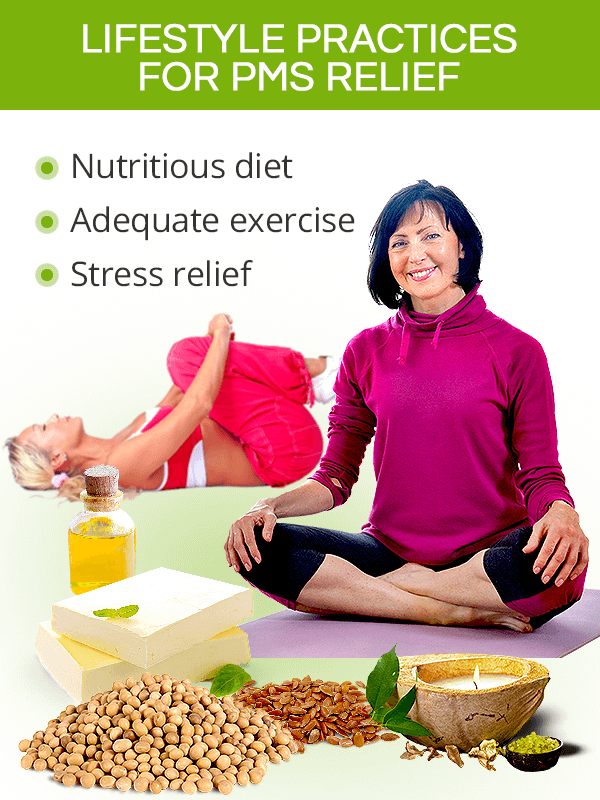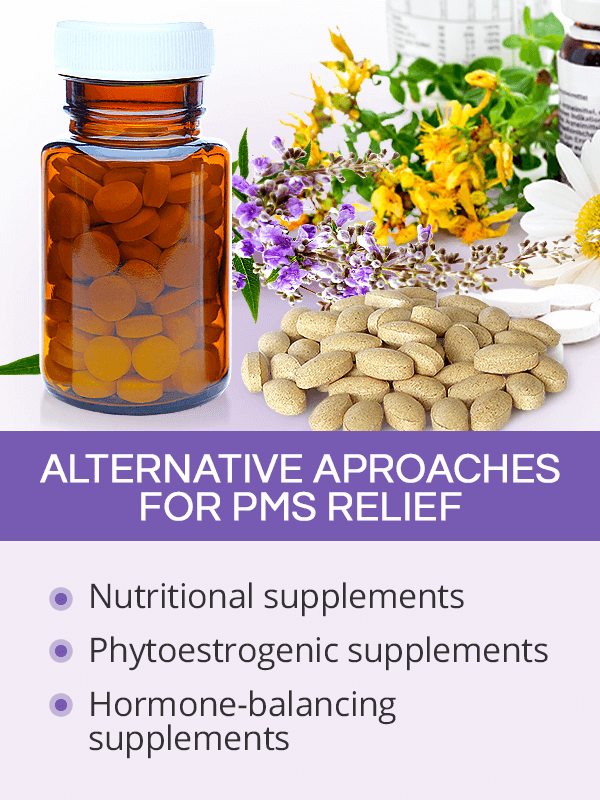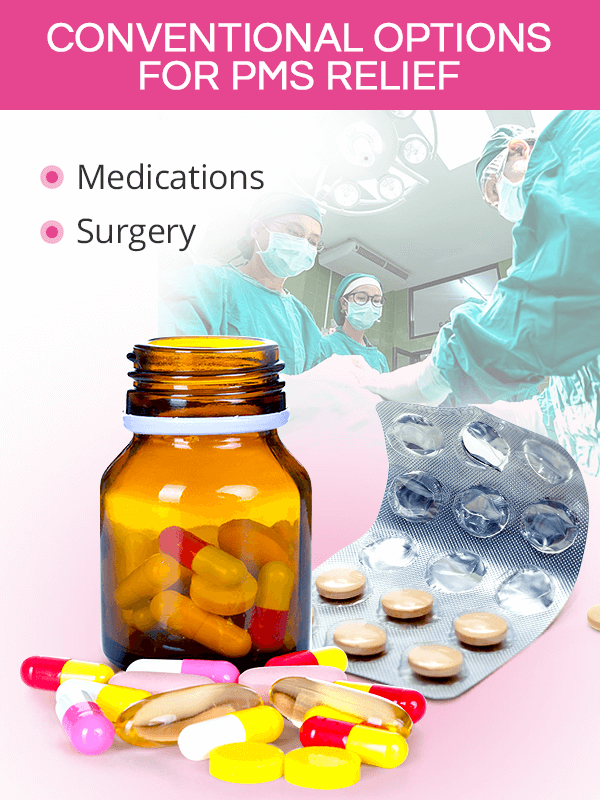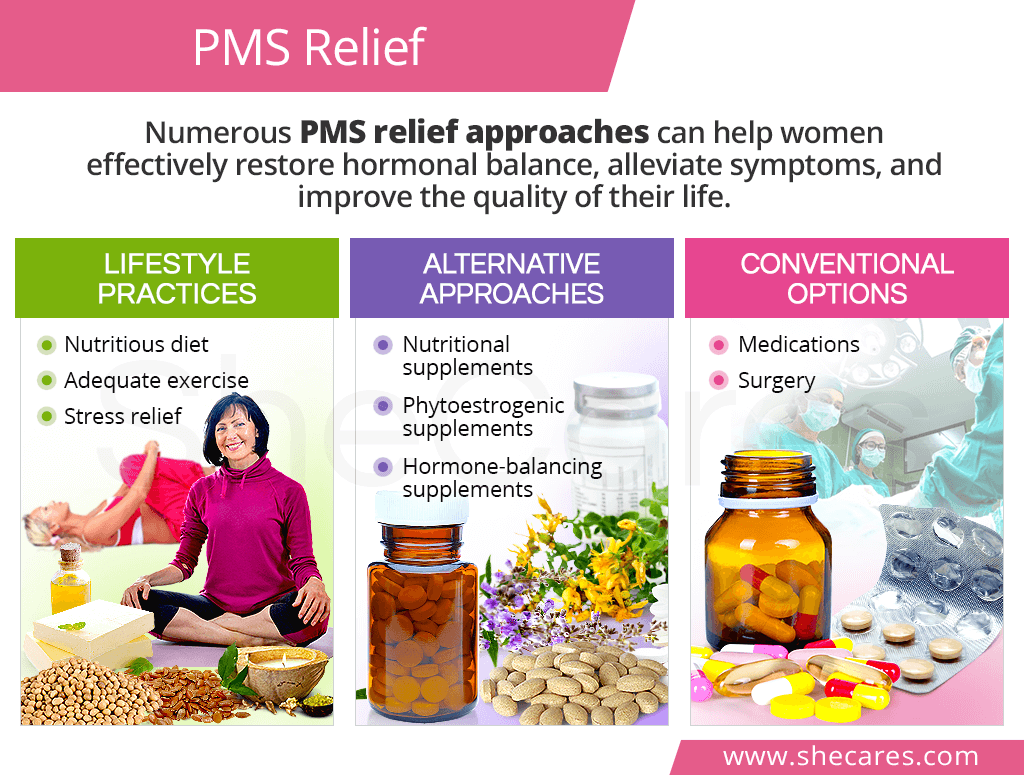Lifestyle Practices for PMS Relief

Since a woman's period patterns reflect her overall health, and her health is heavily influenced by her lifestyle choices, optimizing daily practices can bring direct improvements to menstrual health.
Nutritious Diet
Diet - the type and amount of foods we consume - has a strong correlation with our hormonal health. The nutrients we give our bodies enable them to perform their physiological functions, including producing hormones, and also ensure adequate body fat percentage that the body needs to maintain menstruation.
Recommendations: A well-balanced diet provides all three macronutrients - healthy fats, lean protein, and complex carbs - and period-essential micronutrients, like iron, calcium, and vitamin D.1,2 Adding phytoestrogenic foods, like soy or flax, and remembering proper hydration can help with PMS pain relief as well as other symptoms, like bloating.
Adequate Exercise
Physical activity has numerous positive effects on human body, including hormonal balance and menstruation. It has been shown to alleviate painful cramps, muscle tension, and bloating; relieve stress and anxiety; and improve mood swings and irritability, making women less likely to reach for PMS medications to ease their symptoms.3,4
Recommendations: For exercise to be beneficial for menstrual relief, it has to be kept at a low to moderate level to prevent over-training and the hormone deregulation it can trigger. When experiencing PMS symptoms, women should vary their workouts and opt for light cardio, like walking or dancing, as well as muscle-strengthening workouts, like yoga.
Stress Relief
Stress - due to its ability to cause hormonal changes - is one of the main culprits of PMS. In fact, studies have found that women who experienced stress at the beginning of the menstrual cycle were four times more likely to experience moderate to severe PMS in comparison to women who did not report feeling stressed.5
Recommendations: To prevent stress accumulation, it is best to find ways to relieve it on a regular basis. Meditation, including mindfulness, is one of the most widely studied techniques that has been shown to improve perceived pain and other PMS symptoms.6 Others include deep breathing, tai chi, or visualization.
Alternative Options
A number of other natural approaches can come in handy when a woman needs fast and effective PMS relief. Since every woman's symptoms vary, she is encouraged to experiment with various options to find several that she can keep handy when painful symptoms suddenly strike.
Recommendations: A good place to start is by exploring home remedies for periods, such as heat applications to relax abdominal muscles and relieve cramps. Other effective strategies for physical and psychological PMS symptoms can include aromatherapy with relaxation-promoting essential oils, massage, or biofeedback.7,8,9
Supplements for PMS Relief

Besides the aforementioned lifestyle practices proven to bring women menstrual pain relief, there are several supplements that can help as well, among them being nutritional, phytoestrogenic, and hormone-balancing.
Nutritional Supplements
Certain nutritional lacks - e.g. in calcium, magnesium, and vitamin B6 - may contribute to the development of PMS symptoms. While diet should be the primary source of nutrients, some women may need to obtain them from supplements.
Recommendations: Before starting any supplement regimen, including over-the-counter vitamins, it is best to consult with a doctor to ensure they are truly needed, confirm dosage, and inquire about potential adverse reactions.
Phytoestrogenic Supplements
Phytoestrogenic supplements are made from plants that contain compounds called phytoestrogens, which mimic the function of the body's estrogen. By doing so, they fill in the hormonal gap and help alleviate PMS symptoms.
Recommendations: Although phytoestrogenic supplements, like chasteberry or St. John's wort, can offer effective menstrual relief, they should be used short-term to avoid dependency, which could cause further imbalance.
Hormone-Balancing Supplements
Hormone-regulating supplements do not supply the body with plant-based hormones. Instead, they contain alkaloids that nourish the endocrine glands and gently stimulate their optimal function to alleviate PMS symptoms.
Recommendations: Since hormone-balancing supplements, like Macafem, do not introduce any outside hormones, they can be used long-term to maintain hormonal balance, thus offering lasting PMS relief.
Medications & Surgery for PMS Relief

Women with severe symptoms might require more advanced options for PMS relief. These include medications and surgery, which - although effective - should be used with caution as they may increase the risk of potential side effects.
Medications
PMS medications come in a wide variety of forms, depending on the symptoms a woman wants to relieve. Options include over-the-counter and prescription medicines that work by relieving menstrual pain, like ibuprofen or diclofenac; alleviating bloating, like simethicone; or easing mood swings or depression, like antidepressants, among others.
Recommendations: Because the safety and effectiveness of any medication is greatly influenced by one's health status, current medications, or allergies, their use should be discussed with a doctor before starting any regimen.
Surgery
Surgery is generally reserved for women with severe period symptoms due to uterine polyps, fibroids, or endometriosis, among other conditions. It is the last resort not only because of increased risks of complications, but also because some options - like ovary or uterus removal - may trigger menopause and halt women's chances for pregnancy.
Recommendations: Women struggling with extreme PMS symptoms will typically undergo thorough testing, including imaging scans, to have a clear view of their cause before deciding on a possible surgery for menstrual pain relief.
Key Takeaways
Studies have shown that many women bear painful periods without seeking PMS relief.6 Wrongly so because the majority of them could successfully restore hormonal balance, alleviate their symptoms, and improve the quality of their life. When discussing options for menstrual relief, there are three levels that women can consider: lifestyle changes, which include improving her diet, workout routines, and daily habits; supplements, including period-essential vitamins and minerals as well as phytoestrogenic or hormone-regulating herbs, like Macafem Healthy Periods; and medications and surgery, which can resolve a wide variety of PMS discomforts. Because the first two levels – a healthy lifestyle ad herbal supplements – come with virtually no risks, they are generally recommended as the first line of treatment.
Sources
- Informed Health. (2020). What types of surgery are effective for heavy periods? Retrieved March 3, 2020 from https://www.ncbi.nlm.nih.gov/books/NBK435697/
- Mayo Clinic. (2020). Premenstrual syndrome (PMS). Retrieved March 3, 2020 from https://www.mayoclinic.org/diseases-conditions/premenstrual-syndrome/diagnosis-treatment/drc-20376787
- NIH. (2010). Prior stress could worsen premenstrual symptoms, NIH study finds. Retrieved March 25, 2020 from https://www.nih.gov/news-events/news-releases/prior-stress-could-worsen-premenstrual-symptoms-nih-study-finds
- Office on Women's Health. (2018). Premenstrual syndrome (PMS). Retrieved March 3, 2020 from https://www.womenshealth.gov/menstrual-cycle/premenstrual-syndrome
Footnotes:
- Archives of Internal Medicine. (2005). Calcium and vitamin D intake and risk of incident premenstrual syndrome. Retrieved March 25, 2020 from https://www.ncbi.nlm.nih.gov/pubmed/15956003
- BioMed Research International. (2013). Association of iron depletion with menstruation and dietary intake indices in pubertal girls: the healthy growth study. Retrieved March 25, 2020 from https://www.ncbi.nlm.nih.gov/pmc/articles/PMC3885188/
- Sports Medicine. (2012). Exercise and primary Dysmenorrhea. Retrieved March 25, 2020 from https://link.springer.com/article/10.2165/00007256-200838080-00004
- Rakhshaee, Z. (2011). Effect of Three Yoga Poses (Cobra, Cat and Fish Poses) in Women with Primary Dysmenorrhea: A Randomized Clinical Trial. Retrieved March 25, 2020 from https://www.jpagonline.org/article/S1083-3188(11)00060-X/fulltext
- Journal of Women's Health. (2010). Perceived Stress and Severity of Perimenstrual Symptoms: The BioCycle Study. Retrieved March 25, 2020 from https://www.ncbi.nlm.nih.gov/pmc/articles/PMC2875955/
- Mindfulness. (2011). Relationships Among Premenstrual Symptom Reports, Menstrual Attitudes, and Mindfulness. Retrieved March 25, 2020 from https://www.ncbi.nlm.nih.gov/pmc/articles/PMC4859870/
- The Journal of Obstetrics & Gynecology Research. (2012). Pain relief assessment by aromatic essential oil massage on outpatients with primary dysmenorrhea: A randomized, double‐blind clinical trial. Retrieved March 25, 2020 from https://obgyn.onlinelibrary.wiley.com/doi/abs/10.1111/j.1447-0756.2011.01802.x
- Journal of Psychosomatic Obstetrics and Gynaecology. (2000). Premenstrual symptoms are relieved by massage therapy. Retrieved March 25, 2020 from https://www.ncbi.nlm.nih.gov/pubmed/10907210
- Neuropsychiatry. (2017). Effects of Biofeedback Training on Resting-State Electrophysiology and Emotion: Evidences from the Females with Premenstrual Syndrome. Retrieved March 25, 2020 from http://www.jneuropsychiatry.org/peer-review/effects-of-biofeedback-training-on-restingstate-electrophysiology-and-emotion-evidences-from-the-females-with-premenstrual-syndrom-12063.html
